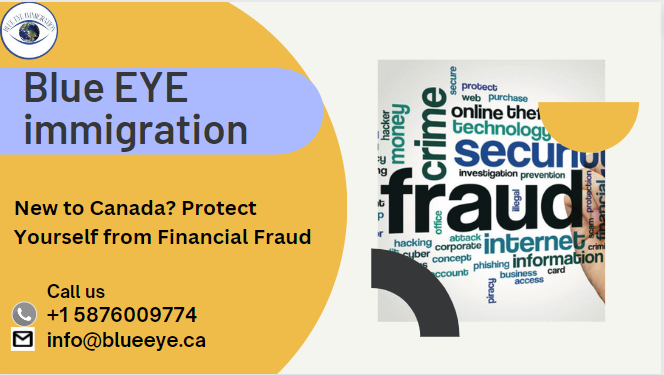Here are some tips to help protect yourself against financial fraud.
Fraudsters may target newcomers who are not familiar with the Canadian financial system and its regulations.
Financial fraud can have long-lasting effects on your credit history[1] and financial security. To stay safe and confident, it is a good idea to educate yourself on what financial fraud is, the common types of fraud that target newcomers, and what you can do to protect yourself.
What is financial fraud?
Financial fraud occurs when someone tricks you to gain access to your money or personal information. There are many types, but they all involve taking advantage of someone’s trust.
As a newcomer to Canada, you may be more vulnerable to certain types of fraud.
Some of the most common types of fraud that target newcomers include:
- Fraudulent immigration consultants[2]: You may require the help of an immigration consultant to navigate the process. Fraudulent consultants may back out of providing promised paperwork for citizenship or jobs after being paid. It is a good idea to do your research first and choose a reputable consultant. To verify the legitimacy of immigration professionals, you can consult official Canadian registries and directories.
- Rental apartment scams[3]: You may be looking to rent a home once you have arrived in Canada. Scammers may advertise rental properties that they do not actually own. They pose as the property owner and may claim to be abroad or somehow unable to show you the property in person. They may ask for a deposit or first month’s rent before disappearing with your money.
- Phone call scams[4]: You may not be familiar with what to expect from government agencies. For example, be wary of callers claiming they are the Canada Revenue Agency (CRA) or a government agency. They may ask for personal information or threaten legal action if you do not pay a supposed debt.
Here are some tips to help protect yourself against financial fraud:
- Never share passwords or PINs[5]: In addition to never sharing your password with anyone, it is also important not to choose easily guessed passwords or enter passwords on devices you do not control.
- Be cautious with unknown emails (phishing[6]): Do not open any suspicious emails, attachments or click on links from strangers.
- Be wary of purchase scams[7]: When making an online purchase be sure to check the website’s reviews, reputation, and refund policy before clicking to pay.
- Stay protected from identity theft[8]: It is advisable to avoid sharing sensitive information such as your phone number, full birthdate and location with anyone, especially those you do not know well.
- Use secure websites: It is a good rule to only use secure websites when entering personal information or making online purchases. Look for “https” at the start of the URL as well as a tiny padlock in your browser’s address bar. This will indicate the site is secured.
- Refrain from acting quickly: Scammers often rush you into making urgent decisions. Speak with people you trust and ensure you do your research before making any financial decisions.
Things you can do if you believe you are the victim of fraud:
If you suspect you have been a victim of fraud, it is important to take immediate action to minimize the damage and prevent further loss. Here are some recommended steps you can take:
- Contact your financial institution[9]: If you suspect that your bank account or credit card has been compromised, contact your financial institution immediately. They can freeze your accounts and minimize further fraudulent activity. You should also request a new debit or credit card.
- Report the fraud to the Canadian Anti-Fraud Centre[10]: You can report fraud to your local police and Canadian Anti-Fraud Centre, a national fraud reporting centre that collects information about scams and frauds. These resources can provide you with guidance on next steps.
It is also helpful to understand what financial institutions like TD Bank will not ask you.
TD Bank will NEVER:
- call you to ask for personal information over the phone
- request access to your personal computer
- ask you to transfer money as part of an investigation
- ask you to purchase gift cards
- ask you to be dishonest
Be sure to contact us for additional assistance and advice on financial fraud, or if you believe your TD account has been compromised. Visit us here to learn more.
Why Choose TD?
150 years helping Canadians:
TD has a proud history of delivering financial solutions to Canadians for more than 150 years. TD also brings a century of experience helping newcomers navigate the unique challenges of the Canadian banking system.
With over a thousand branches and a reputation for excellence in financial services, TD has become one of the largest and most trusted banks in Canada, now serving 16 million Canadians.
TD offers online support and resources of interest to newcomers on topics such as banking basics, moving to Canada, credit score essentials, and more. TD has more than 1,100 branches and can also serve you in more than 50 languages . TD is open longer hours for your convenience. TD has thousands of ATMs across Canada to help you take care of your everyday banking quickly and easily.
